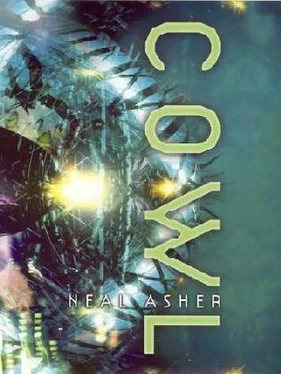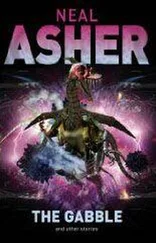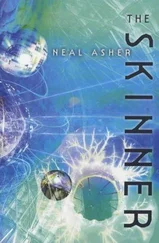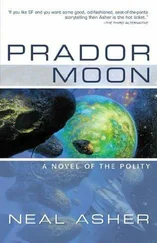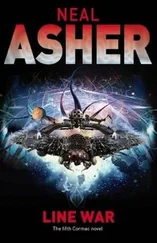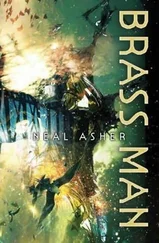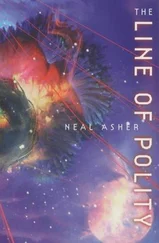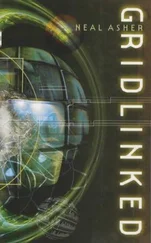Neal Asher - Cowl
Здесь есть возможность читать онлайн «Neal Asher - Cowl» весь текст электронной книги совершенно бесплатно (целиком полную версию без сокращений). В некоторых случаях можно слушать аудио, скачать через торрент в формате fb2 и присутствует краткое содержание. Год выпуска: 2004, Жанр: Фантастика и фэнтези, на английском языке. Описание произведения, (предисловие) а так же отзывы посетителей доступны на портале библиотеки ЛибКат.
- Название:Cowl
- Автор:
- Жанр:
- Год:2004
- ISBN:нет данных
- Рейтинг книги:4 / 5. Голосов: 1
-
Избранное:Добавить в избранное
- Отзывы:
-
Ваша оценка:
- 80
- 1
- 2
- 3
- 4
- 5
Cowl: краткое содержание, описание и аннотация
Предлагаем к чтению аннотацию, описание, краткое содержание или предисловие (зависит от того, что написал сам автор книги «Cowl»). Если вы не нашли необходимую информацию о книге — напишите в комментариях, мы постараемся отыскать её.
In the far future, the Heliothane Dominion is triumphant in the solar system, after a bitter war with their Umbrathane progenitors. But some of the enemy have escaped into the past, intent on wreaking havoc across time. The worst of these is Cowl, an artifically forced advance in human evolution.
Cowl — читать онлайн бесплатно полную книгу (весь текст) целиком
Ниже представлен текст книги, разбитый по страницам. Система сохранения места последней прочитанной страницы, позволяет с удобством читать онлайн бесплатно книгу «Cowl», без необходимости каждый раз заново искать на чём Вы остановились. Поставьте закладку, и сможете в любой момент перейти на страницу, на которой закончили чтение.
Интервал:
Закладка:
Reaching the edge of the sandbar, Tacitus scrambled up the rocky face and began to head out onto the promontory itself. After a moment he noted that scattered over the stone were nautiloid shells the size of dinner plates. He laughed and kicked one into the sea. Drew his sword and waved it at the sky.
‘Send them now, curse you!’ he shouted at the gods. ‘Send your monsters and your trials!’
But there was no immediate response and, from past experience, he expected none. Usually the monsters came in the night, sniffing after him as if after spoiled meat.
He moved on towards the end of the promontory, where he squatted and gazed down into the deep water. His head was buzzing almost as if he was getting too much air, and he noted that his breathing was shallow. Observing a nautiloid drifting along in the pellucid depths, with its tentacles outstretched and its shell striped red and white, he wondered if he was beginning to see the kind of visions wounded soldiers saw before dying.
He prodded at the surface of the water with his gladius and something rose up out of those same depths, in an expanding ring around the nautiloid, like an odd piece of jewellery carved from grey rock, ivory and rose quartz. The nautiloid jetted aside in a cloud of ink and the circle kept growing larger. Then Tacitus realized his challenge had been answered.
Recognizing the apparition in that instant as an enormous open mouth, Tacitus flung himself back as a huge fish shot up over the rim of stone in an explosion of foam. Its mouth was filled with jagged teeth, its blunt head armoured. He shoved himself further away, sliding on his backside, the sea boiling behind the great creature as, with its moray tail, it tried to force itself further onto the promontory. Realizing he was getting close to the sea on the other side, he scrambled to his feet, and turned and ran. After thrashing around, trying to get to him, the sea boiling and spindrift tumbling through the air, the giant fish flipped back into the water with a huge splash, then came hammering alongside the promontory, driving a wave before it. Tacitus leapt onto the beach as the wave also reached it, and didn’t stop running until he reached the wall of vegetation. Turning, he watched the fish, half emerged from the water, begin thrashing from side to side to pull itself back into the sea. He spat on the sand—recognizing this sending from Neptune—then turned to peer into the greenery.
The vegetation was so dense that there was no easy path through it. Large, unlikely insects moved about in its shade, clinging to the underside of bedspread-sized leaves, or camouflaged against the trunks of plants like green spears. He did not care to venture in there amongst those horrors, but was hungry again, and certainly didn’t want to be down near the shore collecting shellfish.
‘Curse you,’ he muttered.
Tacitus removed, from the sack he had made from his tattered cloak a jug he had found on one of those past seashores and drank water collected from another age. Looking around, he noted how dank everything seemed inside the jungle, while at the upper edge of the beach extended a drift of bleached wood and other dried-out organic matter, including piles of triple-ribbed carapaces. Warily eyeing the shoreline, he collected some of these and, using a flint spearhead he had taken from some primitive who had been sent against him and tinder he had collected from a place as dry and hot as his native land in summer, he began the laborious process of striking sparks from his sword to ignite a fire. When it was going he piled on a log, from underneath which scuttled large horrible sealice with scorpion forelimbs, then turned back towards the jungle in search of food. Spotting a horrible insect the size of a flattened chicken, he pinned it with his gladius to one of the spear trees, then roasted it over the fire, before devouring its fragrant prawn-flavoured flesh. Later, having partially denuded the nearby jungle of similar creatures, he lay down and slept in bright sunlight, surrounded by the carnage of his meal. And dreamed of vengeance.
After carving the herrerasaur he had roasted with the microwave setting on his carbine, Tack tentatively ate a piece.
‘Chicken,’ he said.
‘Chicken’s grandad about a billon times removed,’ Saphothere replied.
Tack wiped his knife on fallen needles and rejoined the traveller.
‘What happened?’ Saphothere asked without raising his head.
‘From what point?’ Tack asked.
Saphothere now looked up. ‘My memory is completely blank from the moment we embarked until I came to and saw you fighting our dinner there.’
‘The interspace adjacent to Sauros was… rough. The second attack came earlier than Goron or his people supposed, and we went straight into torbeast incursion surfaces, displacement fields and spillover from the occasional tactical being employed. We came out of it here with actual momentum. The mantisal bounced a couple of times and came to rest against this tree. I got you out and the mantisal returned to interspace—on its second try.’
Saphothere nodded, then held up his injured arm enquiringly.
Tack went on, ‘I checked you over thoroughly. Besides vorpal draining you had suffered a broken arm—both bones—and some cracked ribs, and your heart had stopped. I used adrenalin and a discharger to get things going again and made some necessary repairs.’
‘You saved my life,’ observed Saphothere. ‘Yet your programming probably gave you a choice—you could have just gone on and left me.’
‘It seemed the right thing to do.’ Tack sat, staring at the fire and feeling uncomfortable. ‘I need you to take me as far back in time as possible by mantisal, so I can conserve my energies for the fight that follows.’ But his words fell on deaf ears, for when he looked up again, he saw that Saphothere was fast asleep.
Saphothere needed five days of rest before attempting to summon the mantisal again, and it was a relief when it appeared intact. The two surviving herrerasaurs, which had been lurking around the encampment all the time and twice had to be driven off, were left to dispute the ripe remains of their kin, and the bones the two men had stripped of meat. Interspace no longer seemed as dangerous as it had done, but Tack sensed in it a weird difference, like some presence. He gazed out at the grey void overlying midnight—the nearest interpretation his customary senses could put upon the view—and noted the terminus of the wormhole, looking like a distant sliver of silver inserted at what might be called the horizon. But whatever was bothering Tack wasn’t there.
‘Look to the interface,’ suggested Saphothere.
Tack peered at the black surface of the pseudo sea. Then, with that ability to distort perception he had acquired by riding the mantisal, he looked harder. There at first, infinitely deep, he observed a great tree like some vast water plant. Focusing on it was like trying to discern the final edge of a Mandelbrot pattern. Leviathan heads of tissue consisted of feeding mouths and wormish tangles of endless necks, surfaces of skin curved away into nether spaces. Thicker branches were at once serpentine torsos and the interior glimpses of bottomless intestines. Organs layered over and within each other like mountain ranges. And when at last Tack felt he was gaining some focus, some perspective, it all tumbled away and he realized he was seeing only that fraction of it his mind could interpret.
‘It’s quiescent at the moment,’ Saphothere explained. ‘Though “moment” is stretching the word—like us all it exists in its own time, and that time might bear no relation to any other.’
‘The torbeast,’ Tack stated.
‘Yeah,’ said Saphothere.
‘What are you going to do about this creature when Cowl is dead?’ Tack asked.
Читать дальшеИнтервал:
Закладка:
Похожие книги на «Cowl»
Представляем Вашему вниманию похожие книги на «Cowl» списком для выбора. Мы отобрали схожую по названию и смыслу литературу в надежде предоставить читателям больше вариантов отыскать новые, интересные, ещё непрочитанные произведения.
Обсуждение, отзывы о книге «Cowl» и просто собственные мнения читателей. Оставьте ваши комментарии, напишите, что Вы думаете о произведении, его смысле или главных героях. Укажите что конкретно понравилось, а что нет, и почему Вы так считаете.
